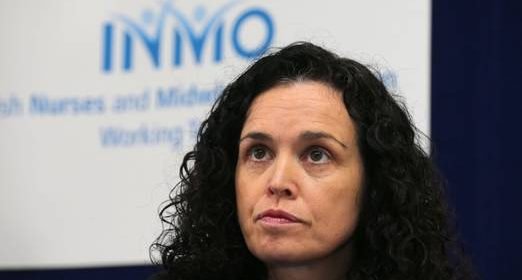Nurses in favour of work stoppages in bid to win pay rise

Hospital patients may face 24-hour strikes from next month.
More than 40,000 nurses and midwives have voted by a huge majority in favour of work stoppages to get pay rises.
But Finance Minister Paschal Donohoe’s department has warned they face severe penalties if they take industrial action.
They will not get a €190m pay deal for new entrants worth €3,300 each from next March, as well as a nine-month delay in wage hikes already due under the current public sector pay deal, and an increment freeze.
The Irish Nurses and Midwives Organisation said 95pc of its members backed strike action in a ballot.
Members of the Psychiatric Nurses Association have already voted in favour of industrial action over pay.
The INMO’s executive council will decide dates for a 24-hour national strike, in which members will only provide emergency and lifesaving care, at a meeting next month.
The council will meet on January 7- 8 to discuss the ballot result and decide the next steps.
It must give three weeks notice of any industrial action, which means strikes could not take place until the end of January at the earliest.
The Government has already offered the nurses a €20m pay package to address recruitment and retention issues – but these increases would only apply to specialist grades.
Nurses want equal pay with professional staff, including radiographers and physiotherapists. The Department of Health claims this would cost €300m, and involve pay rises in the region of 12pc.
The nursing unions claim the increases are justified because of a recruitment and retention crisis.
But the Government’s pay advisory body, the Public Service Pay Commission, found there is no general recruitment crisis among nurses.
It put forward the €20m offer for specialist nurses where there might be some difficulty attracting staff.
However, deputy general secretary of the INMO, Dave Hughes, claimed the commission did not get satisfactory information from the HSE.
INMO general secretary Phil Ní Sheaghdha said Irish nurses and midwives were speaking with one clear voice.
“This vote reflects a deep frustration in our professions, which the Government cannot continue to ignore,” she said.
“Nurses and midwives simply want to do their jobs and care for patients properly. But low pay has led to staff shortages, compromising safe care.
“Ireland’s current haphazard approach to nurse staffing is costly and bad for patient care, as confirmed by the Minister for Health’s own nursing taskforce.”
Mr Donohoe suggested that any industrial action would be a breach of the public sector pay deal.
“Parties outside the PSSA cannot expect to enjoy the benefits of the agreement,” said a spokesperson for his department. “This includes a slower restoration of pay, freezing of incremental progressions, less favourable arrangements for the additional superannuation contribution.
“Also, those outside the agreement would not fall to benefit from the recommendations of the Public Service Pay Commission or the recently announced agreement under the PSSA on new entrant pay scales.”
Minister for Health Simon Harris appeared optimistic that the dispute can be resolved. “Officials from my department and the HSE, along with both nursing unions, have been invited to attend the National Oversight Body today,” he said. “I believe that this is a positive step and should assist in reaching a solution.”
Source: Read Full Article